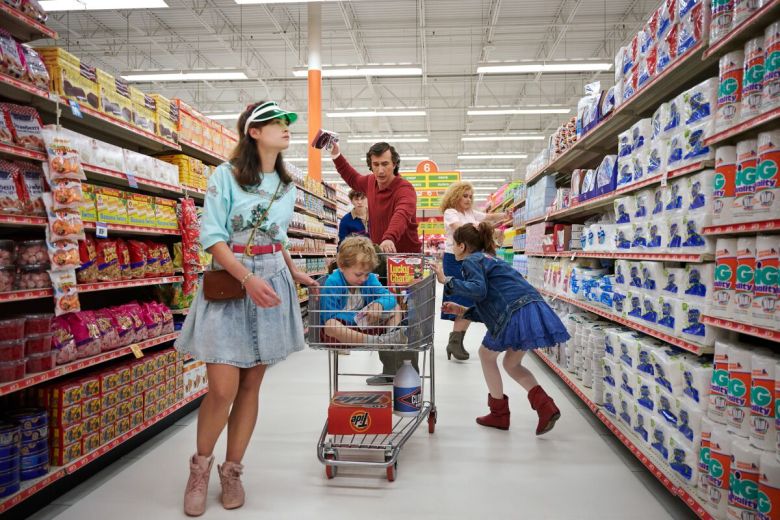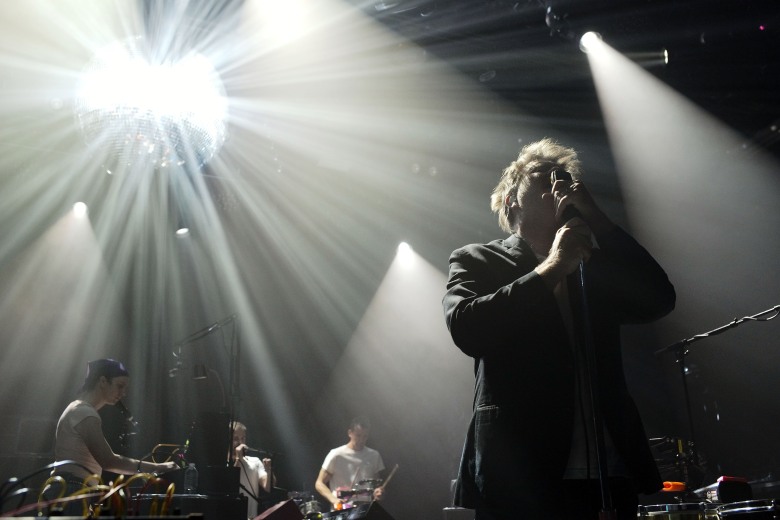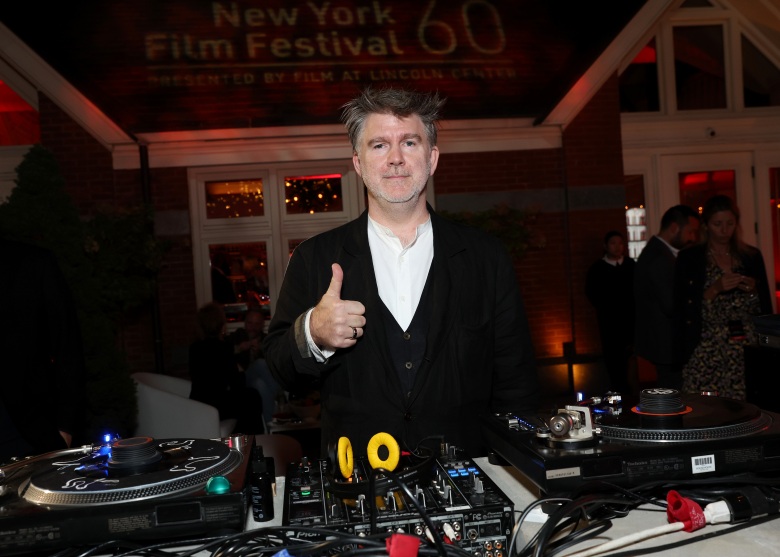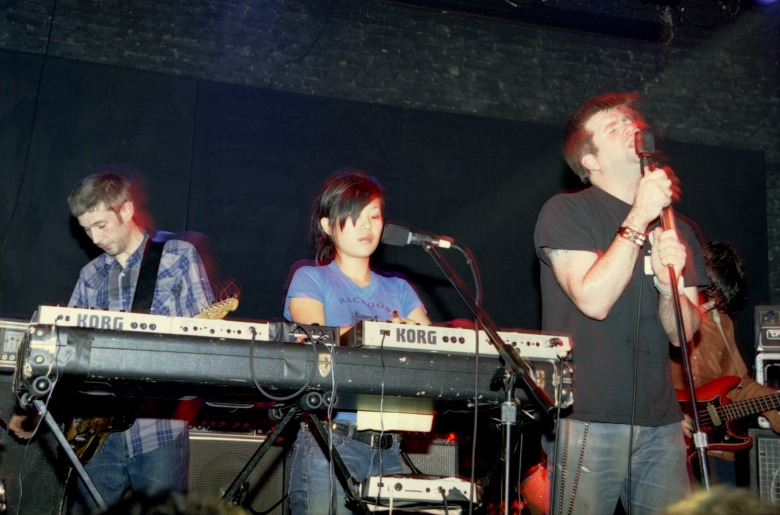Dance rock sensation LCD Soundsystem hasn’t released an album since 2017, but the band more than made up for lost time with a single track that gave one of the year’s most ambitious new American movies its greatest sequence.
At the very end of “White Noise,” writer/director Noah Baumbach’s adaptation of Don DeLillo’s 1985 novel, the main characters walk into a supermarket as the entire room breaks into dance. “New Body Rhumba,” the latest composition by LCD frontman James Murphy, provides yet another example of the energizing synths and bass combo that the band has done so well since they first dominated the New York indie rock scene two decades ago. Set to a dizzying arrangement of dances across aisles and checkout counters, it transforms the entire movie into a surreal modernist musical of the highest order.
Murphy’s eccentric lyrics are at once satirical and sincere, suggesting a sense of personal yearning in the midst of society’s most homogenizing, consumerist impulses. The song is a revelation on several fronts: It elevates the odd tonal balance of Baumbach’s genre-shifting saga, a marriage story that doubles as a disaster movie before reverting back to its original form; at the same time, “New Body Rhumba” proves that over 20 years after LCD Soundsystem’s “Losing My Edge” established their bonafides, they still deliver infectious rhythms with ideas to spare.
With all that in mind, it’s no wonder that the track made the Oscar short list for Best Original Song, even if it’s hard to fathom someone like Murphy — a perennial embodiment of New York hipsterdom showing its age — at the center of the awards race. It’s certainly a competitive year for the category, with everyone from Lady Gaga (“Top Gun: Maverick”) to Rihanna (“Black Panther: Wakanda Forever”) jockeying for spots alongside apparent frontrunner “Naatu Naatu” from Indian megahit “RRR.” However, Murphy deserves frontrunner status for composing a truly thrilling and ebullient button that gives “White Noise” one of the best credits sequences in film history, full stop.
If Murphy hasn’t been a regular presence on the promotional circuit for “White Noise,” well, he’s never been much of a self-promoter in recent years. After the band broke up in 2011 (with a dazzling MSG show portrayed in the documentary “Shut Up and Play the Hits”) then reunited in 2016, Murphy has let the work speak for itself. The band played 20 sets in November and December last year at Brooklyn Steel, but “New Body Rhumba” was the only new material.
These days, the singer-songwriter sticks to his homegrown world. He still owns The Four Horsemen, the Williamsburg restaurant he opened with his wife in 2015, and lives next door. In between the residence and the business, he maintains a newly refurbished studio. On a recent weekday, he fiddled with his espresso machine and then sat down with IndieWire to discuss the genesis of the new song, as well as how it relates to his broader impulses as a musician. He also clarified the history of the band’s breakup and why he’s fairly certain it won’t happen again.
This interview has been edited and condensed for clarity.
How do you feel about “New Body Rhumba” making the Oscar shortlist?
I’m so excited!
Really?
No, I don’t care.
Not at all?
No, I care because I think the film’s great. It’s a confusing film for some people and I want them to feel compelled to watch it. It does this weird thing where it’s pretending to be a simpler film than it is. There are moments where you think you’re watching “Uncle Buck” and it’s actually fucking insane. It’s oscillating above reality until the end, when it fully escapes from reality, with the song in the last bit. I want to make sure people feel like they need to watch it to understand. In years to come, people will understand how dense it is. For that, I would love to get an award. Also, everyone in the band would find it funny. I’m working on my EGOT. I got a Michelin star next door so it would be a MEGOT. But in general I don’t care about stuff like that.
You last collaborated with Noah on the score for “Greenberg,” but as James Murphy, not LCD Soundsystem. How did this process differ?
We had more time with “Greenberg.” Noah edited at his mother’s apartment around the corner from my old studio. I’d go in, watch a scene with him in the editing suite, we’d talk about it, and I’d go to the studio and make a song. I had a soft-logic idea that made sense for the movie: Lost weekend music, rock stars renting a house that’s not really furnished but can get some really nice gear, not a lot, and they can just make music in there. I used one pair of nice ribbon mics, one pair that was mono, and I did everything with that. It ended up with a tone that unconsciously to me matched California and some esoteric music nerds. It was just really easy. It started off as demos and then we just used it.

“White Noise”
Netflix
Whereas “New Body Rhumba” was a song that defined the end of the movie.
This time, he was like I want just one song, and it’s got to go into this dance thing. I didn’t know this at the time, but the choreographer used a song as a guide track that was one of my songs.
Which song?
I don’t want to say.
I’ll have to guess.
It’s not that hard to figure out. But we talked about using some different music beforehand, like “Higher Love” and “Lay My Love” by Cale and Eno. I was working on some music at this studio in Copenhagen and sending some ideas, but then the choreographer set it to a different song of mine and it was like, “Oh, we shot the dance scene at a different tempo.” I was like, “Aw, fuck!” Normally, if someone gives you a guide track, you’re like, “Alright, this is the tempo,” and you figure out how you’d approach it. But I knew how I’d approach it, because there was my song. So I had to get away from my own song. It was very strange.
Has anyone ever approached you about writing other songs for movies or TV shows?
Not really. Maybe they did and it didn’t get to me. Not a lot gets to me. I still operate the same way I always do, which is that I know some people, and if they are my friends then maybe I’ll do something with them. I don’t live in the world in which other people connect you.
You have popped into other projects, though, like the small role you had in “The Comedy” a few years back. Did you ever have a greater desire to get involved with movies?
I don’t have abstract wants like that. Noah was at one point developing “The Corrections” [for HBO], and I had said I wanted to play the suburban brother, not the brother I would normally play who’s played by Ewan McGregor. So I auditioned and tried to do that. But I would want to do something like that only with Noah. “The Comedy” was just a strange thing because I know Tim and Eric. I wasn’t prepared for that and that’s what I learned. I don’t have any abstract desire to do more film projects.
You’ve described the feeling of needing to finish an album as “album panic.” Do you experience that when you’re working on just one song as well?
It’s not the same panic. With an album panic, the only people I owe a record to are professionals who should know better — meaning the label or a manager. They’re like, “Where’s the record?” And I’m like, “I’m not going to answer to you. That’s not how this works. You know what the deal is. I go and make the record. Tough shit. It comes out when it’s done.” I’m pretty upfront about that and it’s OK. But with this, it’s Noah’s movie. I’m late for him. It’s different. When I’m late for myself, it’s my own career. No one’s going to die. It might be frustrating for somebody but it’s not a big deal.

James Murphy of LCD Soundsystem performs at Brooklyn Steel
Getty Images
I watched you perform “New Body Rhumba” live at Brooklyn Steel and noticed that it had a different kind of energy in that context.
It’s faster and heavier.
There’s also a sense of continuity outside of the “White Noise” context when you hear the song alongside some of your best-known tracks.
I was just making music for Noah. The only goal was to give him what he needed. It sounded like an LCD song. That’s what he wanted. I knew I had to make it for the movie but also make it sound like a song I made and he liked. It had to be made independently of the movie.
The central motif of the chorus — “I need a new body” — reflects back on the idea in “White Noise” of people who grow uncomfortable with their day-to-day lives. How did you land on that motif?
Once I made the basic riff for the body of the song and it was approved, that was all I needed to do. The lyrics were next but I wasn’t too worried about it. It’s not my job to figure out how it plays and what it means. I’d read the book.
In general, how do you approach lyrics in tandem with other aspects of composition?
I just arrange a song and just go sing stuff. That’s how I write. Everything comes out like that. I have songs where I’ve just sung the whole thing and that’s the song. The best stuff usually is automatic. It works better if it’s not overwrought. We don’t want to explain why we want to do something. As the musician as I am, this is what I thought was a good idea, and that’s why I made it. Otherwise, it gets very, like, college essay.
But it retrospect, you must be able to recognize the substance in your lyrics. They aren’t just gibberish.
That’s what naturally happens. One of the things I don’t like about a lot of rock lyrics is that people go in with an idea of what a song is supposed to be about and they make a song about that thing. I just don’t find them very interesting. When you pick those five or six topics, everyone feels kind of the same about them, and it doesn’t really matter.
A lot of your songs, from “Losing My Edge” to “New Body Rhumba,” deal with existential anxiety.

James Murphy at the opening night of the 2022 New York Film Festival
Getty Images for Netflix
I’m always having existential anxiety. I think everybody is on some level. But why not? Noah and I joked that we sometimes say, “Oh, I wish it could be like The Factory in the 60s.” But we both know that if we were at The Factory in the 60s, we’d leave and be like, “Those people were awful. That band was so loud. Who were they trying to impress?”
How do you feel about the shift of cultural awareness online? I noticed you made a snide remark to “like and subscribe” in the banter at one of your recent shows.
I make that joke a lot. It’s not like I’m so sad about the world we live in. It’s more like I find the idea of someone verbally saying “like and subscribe” really funny. It’s not meant to be a complaint. It’s just funny. If you tell a story for too long, you should stop and say: “Link in bio for the whole thing!”
There’s a cynical edge to a lot of your music, but also a sense of play. How has that balanced changed for you over time?
Right now is an interesting moment in history for me, because I’m 52, so I’m the age of people who get colonoscopies. But I’m also the perfect age to have been a young pretentious shit who watched “Koyaanisqatsi.” So I made a joke to a table full of people of a similar where I sang “Colon…os-co-py” to the table, and of course there’s this magical moment where we’re all the right people at the right age for both a colonoscopy and a “Koyaanisqatsi” joke. I like that. To be 52 in 2022 and make a joke about a Philip Glass-scored art film from the ‘80s and your colonoscopy — it’s soul-crushing in a way, but it’s not a complaint.
So you’re not that bothered by the evolution of the cultural landscape? So much of your music wrestles with that.
I feel crushed by the flattening of cool. A little bit. I think it’s sad that everybody’s told that they’re cool. That’s a problem. When I grew up there were kids who just knew they weren’t cool. Dear friends of mine. They would just be like, “I don’t have good taste, I dress like a dummy, I don’t care.” People would just pick these lanes and be OK with what they were. Right now, everyone’s pretty convinced they know what’s cool, or else they’ve made an adjustment. They think they have all the information because they have the internet. They’ve made decisions about how they dress and what they do and what they listen to. Those decisions are clearly cool or they’d make different ones. It’s just a very strange idea to me.
Did any of these changes play a role in your decision to end the band back in 2011?
I didn’t want to do the band anymore for very specific reasons. One was that I met my wife. She was a lawyer and lived in London. She worked 80 hours a week. I was a touring musician. Both of our lives were impossible and soul destroying. I was like, “Well, why I don’t we try to build a life together?” She quit her job and I quit my job and we just spent time together. The other reason was that I was a very competitive person.
Competitive with who?
With early DFA and LCD, I wanted to beat the other bands. I wanted to go play onstage and they’d be like “Oh, that’s neat,” and I’d be like, “Oh no, I want to go wipe you guys off the stage. I wanna win.” That was really fun for a while. To me, we were such underdogs. Every photo of us looked like substitute teachers in the teachers’ lounge. It was a mismatch. We didn’t look cool. We were thrown together by circumstance. That underdog spirit is really enjoyable, but with time, we were no longer underdogs. We were successful and it really felt like if I just kept making records, we’d get bigger. I didn’t know what the point of that was. I didn’t want to be famous. I was older. I had some famous friends and it didn’t seem like a very enjoyable life. It felt invasive and limiting, so what was the goal?
Money? Constant ego enrichment?

LCD Soundsystem performing at Bowery Ballroom NYC on December 14, 2002
Redferns
I didn’t want to be rich and we had swum out of the eddy of competition. We’d been around long enough that we’d been established to some degree. I always feel like when I see bands that are established and they’re still competitive in some way, there’s something gross about it. It’s like, “Ew, what are you doing? Just make music.” When you’re young and hungry, you can be competitive. It’s the difference between Bowie’s “Blue Jean” and “Blackstar,” because “Blue Jean” is trying to have hits and “Blackstar” is just doing something that’s interesting to him. So I quit for those reasons. But also, I thought it would be funny, to just be like, “Nah.”
How do you relate to that period now?
That final show we did was closer to the formation of the band than it is to now. We’ve been a band longer since then than we were at that time. It’s crazy.
How do you explain the path back to the reunion?
We got married, we had a kid, we opened this restaurant. Then my wife wanted to go back to London and get an MBA. We were commuting back and forth. So I was like “OK, I want to do some music.” I’d just done the Bowie stuff with him on “Blackstar” and wanted to make some music of my own. While we were in London, I was working with Al Doyle at his studio and then back in New York at my studio. It was just a nice way to feel like I wasn’t just tagging along. Next thing I knew, I wanted to put this music out. Then I was like, “What do I do? The band’s broken up.” I asked Pat [Mahoney] and Nancy [Whang], “Do you feel like this is LCD music?” I couldn’t put it out and call it James Murphy if I had Pat and Nancy play. But I wouldn’t want to not play with my friends for some weird reason just to save face. If I play with Pat and Nancy, it’s gotta be LCD. They said “Yeah, we’ll play.” So it was LCD. I decided that whatever shit I was going to take for that, I didn’t care too much.
What’s it like now when you look down at young crowds?
I felt like a middle-aged man when we started. I was 32 for the first LCD show. I’d already lived my twenties in punk bands. I’m still getting my head wrapped around how long ago this stuff was. It’s still all part of my post-youth life. It doesn’t feel as far away. We now have kids that come to our show who were like eight when we started — and now they’re like 28! There are people who can legally drink who weren’t born when I first started making music. That’s super weird to me. But I’m fine that we can stand still long enough and find new people who can come see us.
Do you ever think about putting the band aside again and just D.J.ing into the sunset?
Well, D.J.ing is hard, too. I still do it, but it’s late and it’s loud. I’m the happiest I’ve been with the band in 20 years. We all had this reckoning. Nobody intended this to be our lives. And now we’re like, “Shit, I guess this is our lives, to some degree. This is the big thing we’ve done.” Now we accept and love each other. We’re in this kind of wonderful place where it’s not hard work.
It’s not hard work?
It’s hard work! But it’s not hard work to be around each other. There’s no passive-aggressive resentments that bands are always filled with. It’s a really wonderful, nice space. It’s not that grueling.
Really?
It’s grueling to do 20 shows in 30 days. That stuff’s grueling. But it’s fantastic. We’re just lucky that we all still care about each other. It doesn’t go that way often. A lot of my life and relationships haven’t.
A lot of bands do seem to hate each other after a while.
People care about what they do. When I was young, in all the bands I was in, we wanted to murder each other. That’s part of it.
I’m assuming there’s no new album in the works?
I don’t have a new album now. No album panic. It’s not that I don’t want to talk about it. I’m just not in the process of it.
But that will change at some point, yes?
Oh yeah. I’d love to make a record.



